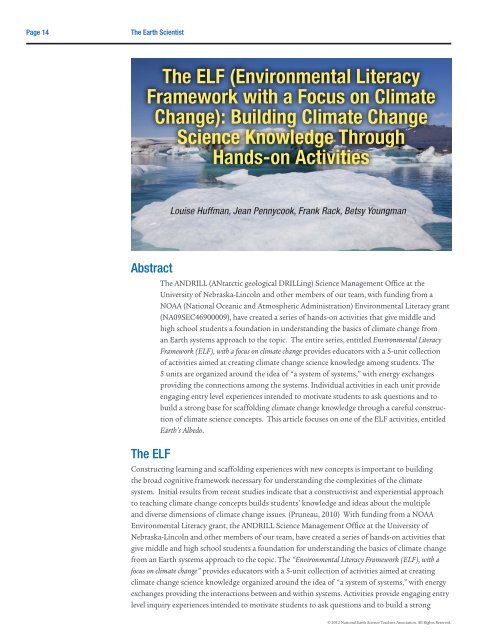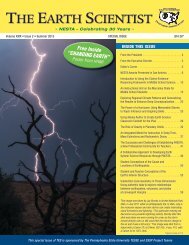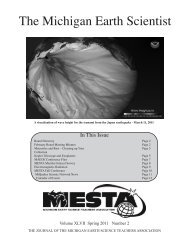The Earth Scientist
Fall 12.pdf - NESTA
Fall 12.pdf - NESTA
- No tags were found...
Create successful ePaper yourself
Turn your PDF publications into a flip-book with our unique Google optimized e-Paper software.
Page 14<br />
<strong>The</strong> <strong>Earth</strong> <strong>Scientist</strong><br />
<strong>The</strong> ELF (Environmental Literacy<br />
Framework with a Focus on Climate<br />
Change): Building Climate Change<br />
Science Knowledge Through<br />
Hands‐on Activities<br />
Louise Huffman, Jean Pennycook, Frank Rack, Betsy Youngman<br />
Abstract<br />
<strong>The</strong> ELF<br />
<strong>The</strong> ANDRILL (ANtarctic geological DRILLing) Science Management Office at the<br />
University of Nebraska-Lincoln and other members of our team, with funding from a<br />
NOAA (National Oceanic and Atmospheric Administration) Environmental Literacy grant<br />
(NA09SEC46900009), have created a series of hands-on activities that give middle and<br />
high school students a foundation in understanding the basics of climate change from<br />
an <strong>Earth</strong> systems approach to the topic. <strong>The</strong> entire series, entitled Environmental Literacy<br />
Framework (ELF), with a focus on climate change provides educators with a 5-unit collection<br />
of activities aimed at creating climate change science knowledge among students. <strong>The</strong><br />
5 units are organized around the idea of “a system of systems,” with energy exchanges<br />
providing the connections among the systems. Individual activities in each unit provide<br />
engaging entry level experiences intended to motivate students to ask questions and to<br />
build a strong base for scaffolding climate change knowledge through a careful construction<br />
of climate science concepts. This article focuses on one of the ELF activities, entitled<br />
<strong>Earth</strong>’s Albedo.<br />
Constructing learning and scaffolding experiences with new concepts is important to building<br />
the broad cognitive framework necessary for understanding the complexities of the climate<br />
system. Initial results from recent studies indicate that a constructivist and experiential approach<br />
to teaching climate change concepts builds students’ knowledge and ideas about the multiple<br />
and diverse dimensions of climate change issues. (Pruneau, 2010) With funding from a NOAA<br />
Environmental Literacy grant, the ANDRILL Science Management Office at the University of<br />
Nebraska-Lincoln and other members of our team, have created a series of hands-on activities that<br />
give middle and high school students a foundation for understanding the basics of climate change<br />
from an <strong>Earth</strong> systems approach to the topic. <strong>The</strong> “Environmental Literacy Framework (ELF), with a<br />
focus on climate change” provides educators with a 5-unit collection of activities aimed at creating<br />
climate change science knowledge organized around the idea of “a system of systems,” with energy<br />
exchanges providing the interactions between and within systems. Activities provide engaging entry<br />
level inquiry experiences intended to motivate students to ask questions and to build a strong<br />
© 2012 National <strong>Earth</strong> Science Teachers Association. All Rights Reserved.






